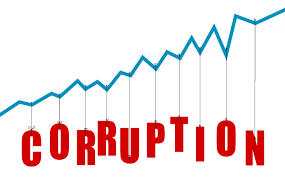 ‘AMONG people generally corrupt, liberty cannot long exist’: so wrote the political philosopher Edmund Burke in 1777. In the dying days of the white Parliament in the early nineties, the editor of the Mail & Guardian, Phillip van Niekerk, wrote frequently of South Africa as a kleptocracy, a state run by people stripping its assets for personal or group advantage before time ran out on them.
‘AMONG people generally corrupt, liberty cannot long exist’: so wrote the political philosopher Edmund Burke in 1777. In the dying days of the white Parliament in the early nineties, the editor of the Mail & Guardian, Phillip van Niekerk, wrote frequently of South Africa as a kleptocracy, a state run by people stripping its assets for personal or group advantage before time ran out on them.
The very doctrine of apartheid was, of course, founded on theft and its most sinister aspect, and arguably its most lasting legacy, was moral corruption. For significant portions of the anti-apartheid movement inside the country the fundamental struggle was not about the wielding of political power, but about national probity and civic morality. The exercise of uncontrolled power had caused major damage in the old South Africa and civil society was apparently determined to set standards and establish a revised moral order in the new nation. But apartheid had flourished through lies and corruption: sadly, historical continuities have proved enduring.
In the new South Africa, corruption comes in many shapes and sizes, and much of it, in fact, does not involve financial gain, the example that springs most readily to people’s minds. Theft of employers’ time is rampant as are abuse of authority, use of patronage, refusal to recognise conflicts of interest, and lack of disclosure. When all of these and the many varieties of misappropriation become so mundane they cease to shock and scandalise, the very fabric of society is under threat. The effect of corruption is to subvert the democratic process, undermining stability, justice, and a sense of nation. Countries in transition from authoritarianism to democracy are particularly vulnerable to corruption and, in the worst-case scenarios like parts of Russia, are eventually run by a criminal mafia.
Corruption means that the size of the cake available for redistribution is diminished, thus undermining social justice; laws designed to alleviate poverty are subverted because officials are looking after personal agendas rather than behaving as true civil servants; and the concept of political debate leading to well-motivated national policy-making becomes a joke. In other words, government is rendered ineffective, investment ultimately comes to a halt because optimism about the future is curtailed, and inefficiency and inequity dominate. We need look no further than our northern border to see the terminal results of corruption in which officially sanctioned plunder and lawlessness are leading to the implosion of society. The very idea of free people living within a nation disappears, ordered society disintegrates, and the warlord with the biggest guns and the most vicious group of thugs makes all the decisions.
The most significant fact about corruption is that it is not simply a matter of theft. The hand in the till, even on a regular and extensive basis and by many people, is not going to destroy an economy or a nation. There are procedures in an ordered society to deal with this and if the justice system is working properly there is a place for perpetrators – in prison. Corruption is a deadly serious matter because it involves a betrayal of trust. We have many examples in South Africa at the highest levels of government: politicians and officials who have taken bribes in cash and kind in exchange for decisions that favour the giver at the expense of the national interest. Nor is this a deplorable habit that can be labelled Third World: companies from the developed world participate vigorously in the system for their own dubious ends, while their politicians deliver homilies about good governance.
One of the most shocking cases to those who were part of the internal struggle for democracy was that of Allan Boesak. It is hard to credit now, but he was a hero in the eighties, articulate and forceful in his condemnation of a reprehensible political order in whose consignment to the dustbin of history he played a major part. Subsequently he fell prey to the temptations of struggle accounting and misappropriated foreign funds. Many millions of rands leaked away in the same fashion, but the significance of Boesak was that as a man of the cloth and influential leader he should have been setting moral standards. The fact that he disappeared into and came out of prison shouting defiance and political slogans to justify his appalling behaviour raised disturbing questions about the quality of political leadership in South Africa, especially after he was feted by senior members of the ruling party on his release. Boesak’s crime was basically a massive act of betrayal of a cause for which many suffered.
There have been other cases, most notably connected with South Africa’s sordid and unnecessary arms deal. What they reveal is very disturbing for the future of democracy. There are the inevitable lies and denials, and a notable lack of resignations at government level. The wages of corruption seem not to shame and disgrace but often produce a posture of indifference and defiance, ranging from having made a mistake to an attitude of entitlement. Many of those caught in the act lash out at the media, but in doing so they simply reinforce a fundamental truth about liberty and democracy: that it comes at the price of eternal vigilance in which a free press has a crucial role to play.
This article was first published in The Witness on 18 February 2003 and entitled ‘Corruption cancer’
Further reading: Terry Crawford-Browne, Eye on the Money: One Man’s Crusade Against Corruption (Roggebaai: Umuzi, 2007)